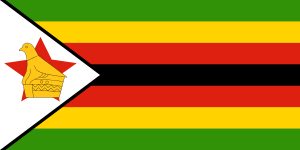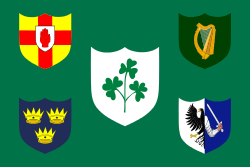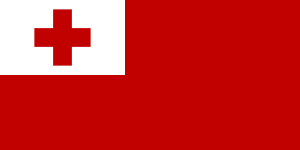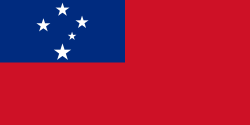1993 Rugby World Cup Sevens
 | |
| Tournament details | |
|---|---|
| Host nation |
|
| Dates | 16 April – 18 April |
| No. of nations | 24 |
| Champions |
|
|
1997 → | |
The inaugural 1993 Rugby World Cup Sevens was held at Murrayfield in Edinburgh, Scotland, in April 1993. The International Rugby Board invited the established rugby union nations but also were keen to involve emerging nations in the event, recognising the fact that Sevens was providing the bridge between the developed rugby nations and those whose rugby union traditions were less well established. England defeated Australia 21-17 to become the first team to hold the Melrose Cup and claim the title world champions.
Background
Prior to 1993, Rugby Sevens had already built up a substantial international presence. The relative ease with which the rules could be learnt and applied, combined with the ability to quickly organise teams due to fewer players, as well as providing a fast paced game for spectators enticed many nations to set up domestic tournaments, and appealed to a large international audience outside of the established power houses of the traditional 15-a-side game. Such was the international popularity of the game that the Scottish Rugby Union were able to organise a well attended International Tournament in 1973 to celebrate the centenary of the Scottish Rugby Union.[1] England came away victorious from that first international event.
Soon after, in early 1975 the Chairman of the Hong Kong Rugby Football Union, A.D.C. "Tokkie" Smith, was talking with tobacco company executive Ian Gow. Gow had been a spectator at the 1973 event and had proposed to Smith to sponsor a Rugby tournament with top teams from throughout the world competing. This gave rise to the inaugural Hong Kong Sevens on March 28, 1976.[2] This tournament grew throughout the 1970s and 1980s in both supporter popularity and the number of participating teams. Sevens was proving to be the bridge between the established international rugby elite and those nations with less resources and less developed professional infrastructures.
In the early 1990s, The Scottish Rugby Union made a proposal to the International Rugby Football Board for the creation of a Rugby Sevens World Cup. The World Cup for the 15-a-side game had been staged successfully in 1987 and 1991 and had proved the worth of such an event. The IRB, which had a duty to involve and help to develop the rugby of the new member unions, recognised the value of Sevens to further this end, and their chairman, Vernon Pugh, enthusiastically agreed. Thus, the IRB organised the first officially sanctioned Rugby World Cup Sevens to be held at Murrayfield in April 1993. The ultimate prize of the competition was to be called the Melrose Cup, named after the small Scottish town of Melrose where the Sevens format had been born in 1883. A butchers apprentice and Melrose 20-a-side quarterback, Ned Haig, suggested having a rugby tournament as part of a sports day to raise funds at the end of the rugby season and his boss David Sanderson proposed playing in a tournament that required reduced numbers of players in each team. On 28 April 1883, the Melrose seven-a-side tournament began, with the time of each match limited to 15 minutes. The first World Cup was held 12 days shy of the 110th anniversary of that first tournament.
Venue
The IRB appropriately situated the tournament in the spiritual home nation of Rugby Sevens, Scotland, and therefore the games in the World Cup were played at the home of Scottish Rugby Union, Murrayfield Stadium.
Qualification
Of the twenty-four nations involved, nineteen were invited and five had to go through pre-tournament qualification. Four of the qualification places were won by Namibia, Hong Kong, Taiwan and Spain who booked their places by reaching the semi-finals of one qualifying event in Sicily. Latvia won their place by beating Russia in the final of a mini-tournament staged in Moscow to decide who would replace the USSR, which had broken up since its invite to the world cup. The other participants were Argentina, Australia, Canada, England, Fiji, France, Ireland, Italy, Japan, Netherlands, New Zealand, Romania, Scotland, Tonga, South Africa, South Korea, USA, Wales and Western Samoa.
Sicily - 1992
Seventeen nations came to Catania, Sicily, in May 1992 (from 29th to 31st) to battle for four qualifying spots in the finals in 1993. They were divided into three groups, five in one and six in the other two. Taiwan, Namibia, Spain and Hong Kong were the successful qualifiers after three group stages and three knockout rounds.[3] The affair was complicated and confused. The group stages produced a situation where, by the transition from the second to the third groups, the lower ranked teams were better off losing to one another in order to face weaker opposition in stage 3. Also, the two teams with the best records leading into the quarter-finals, Namibia (played 8 won 8) and Zimbabwe (played 9 won 7, drawn 1, lost 1) ended up playing each other. Meanwhile a Czechoslovakian side that had won just one match made it to the quarterfinals at the expense of Tunisia that had won 5 of 9.[4]
Determination of Pool Winners: All matches in the tournament carry the following points A Win 3 points, A Draw 2 points, A Loss 1 point. The team with the greatest number of points at the end of preliminary rounds would declared the winner. if teams at this stage are level on points then the winner shall be: (a) the winner of the match in which tied teams played. (b) the team that scored the most tries throughout the Round . (c) the team which has conceded the least number of tries throughout the Round. (d) the total points scored by each team in all matches in the Round shall be divided by total points scored against each team and the team with the higher quotient shall be the winner.
The original groups were as follows:
Group Stage 1
( 29 May 1992)
Source:[4]
The teams that placed in the top four qualified for the second group stage, whilst those eliminated played in the Etna Cup, with the Sicily side making up the numbers for this mini knockout competition.
Group Stage 2
(30 May 1992)
The second stage groupings grouped the three winners together, the three second place teams together etc. Thus:
| Pool D
Results Classification |
Pool E Results Classification |
Pool F Results Classification |
Pool G Results
Classification
|
Group Stage 3
(30 May 1992)
No team was eliminated from stage 2, just rearranged on new seedings that went into Pools H, I, L and M. These four pools of three teams each meant that each team had to play a further two matches and this process resulted in eight teams given a new seeding for the quarterfinals, with four teams eliminated, to play in the Etna Cup.
| Pool H
Results Classification |
Pool I Results
Classification
|
Pool L Results Classification |
Pool M Results Classification |
The end result of Group Stage 3, taking into account all games in the tournament to date was as follows:
| Key to colours in group tables |
|---|
| Team that progressed to the semi-finals and so qualified for world cup (also indicated in bold type) |
| Teams eliminated into Etna Cup (also indicated in italics) |
Team Seed Pld W D L  Namibia
Namibia1 8 8 0 0  Taiwan
Taiwan2 9 6 1 2 .svg.png) Hong Kong
Hong Kong3 9 7 1 1  Spain
Spain4 9 7 0 2  Portugal
Portugal5 8 4 0 4  Czech Republic
Czech Republic6 9 1 3 5  Sweden
Sweden7 8 4 0 4  Zimbabwe
Zimbabwe8 9 7 1 1  Tunisia
TunisiaElim 9 5 2 2  Germany
GermanyElim 9 4 0 5 .svg.png) Belgium
BelgiumElim 9 3 0 6  Poland
PolandElim 8 1 1 6
Knockout Results
(31 May 1992)
| Quarter-finals | Semi-finals | Final | ||||||||
| 31 May 1992 - Catania, Sicily | ||||||||||
| |
16 | |||||||||
| 31 May 1992 - Catania, Sicily | ||||||||||
| |
10 | |||||||||
| |
24 | |||||||||
| 31 May 1992 - Catania, Sicily | ||||||||||
| |
06 | |||||||||
| |
20 | |||||||||
| 31 May 1992 - Catania, Sicily | ||||||||||
| |
12 | |||||||||
| |
26 | |||||||||
| 31 May 1992 - Catania, Sicily | ||||||||||
| |
10 | |||||||||
| |
26 | |||||||||
| 31 May 1992 - Catania, Sicily | ||||||||||
| |
06 | |||||||||
| |
14 | |||||||||
| 31 May 1992 - Catania, Sicily | ||||||||||
| |
12 | |||||||||
| |
10 | |||||||||
| |
06 | |||||||||
Etna Cup
Hosts
|
Stage 1 Eliminated Teams |
Stage 2 Eliminated Teams |
Round 1 Etna Cup (30 May 1992)
| Pool A
Results
Classification
|
Pool B Results Classification |
Round 2 Etna Cup (31 May 1992)
Quarter Finals
![]() Sicily won
Sicily won ![]() Germany lost
Germany lost
![]() Malaysia 10 - 10
Malaysia 10 - 10 ![]() Belgium (extra time 14-10)
Belgium (extra time 14-10)
Semi Finals
![]() Sicily won
Sicily won ![]() Malaysia lost
Malaysia lost
Final
![]() Sicily won
Sicily won ![]() Tunisia lost
Tunisia lost
The Sicilian team were completely fresh and faced opponents who in some cases had played nine draining games. Sicily entered Sunday having played a total of two games. The final was contested by Sicily and Tunisia. Although Tunisia led by 2 points when normal time expired, the Italian referee allowed play to continue until, in the fourteenth minute of the second half, the Sicilians scored.
Former USSR representative
Although the Soviet Union had originally been an invited team, it had subsequently collapsed and the former constituent nations, demanded their own qualifying event. This was held in Moscow where the Latvia team, in their first ever sporting event, overcame Ukraine and Kazakhstan to reach the final where they beat Russia to claim the last place in Edinburgh.[3]
Semi Finals
3/4 Places
Final
Format
The 24 nations were drawn into four pools of six teams with the top two progressing to the Melrose Cup, the third to the Plate and the fourth-placed teams contesting the Bowl competition. The groups were arranged thus:
| Pool A |
Pool B |
Pool C |
Pool D |
Summary
First Round
As expected, the leading nations all made it through. However, only South Africa, New Zealand and Western Samoa could boast unbeaten records at this stage. Fiji, Australia, Tonga, Ireland and England all lost one match in their respective pools. In Pool A Wales, lost to South Africa but distinguished themselves against the powerhouse of sevens rugby, Fiji, coming back from 21-0 down to lose narrowly 21-17. South Africa managed to overcome Fiji in their pool match. In Pool B Ireland had an excellent first round, beating United States 38-0. They lost to New Zealand, who won the group, but finished second. Korea defeated France 14-0 and the French struggled to beat the Netherlands in an earlier tie. However, the French managed to qualify for the Bowl in fourth place, with the surprise being Korea making the Plate competition in third. In Pool C, the hosts Scotland finished fourth behind Argentina in third (although they ended with the same number of match points as the South Americans and had a better points difference they had lost to the Argentinians). The Scots managed to beat eventual group winners Tonga but lost to Australia and Argentina. Both Tonga and Australia lost one match each, and crucially Tonga beat the decider between the two sides meaning that Australia ended second in that group. In Pool D, eventual tournament winners England progressed well but were beaten by the Samoans but 28-10. Samoa went on to win the pool. Despite heavy defeats to England and Samoa, Spain managed to gain third spot just ahead of Canada.
Quarter-Finals
The quarter finals were not knockout but took the form of another round robin with the teams split into two groups. Fiji emerged as the only nation with an unbeaten record after overcoming Ireland, Tonga and Western Samoa in the first. The second group was more fiercely contested with each nation claiming at least one victory. Australia and England who progressed to the semi finals despite their respective defeats by New Zealand and Australia. England had assumed they would top their group and avoid Fiji, even with a defeat to Australia in the final pool game. They opted to rest some first team players but expressed dismay in finding themselves placed second in the group behind Australia. The England team had thought that table placings in the event of a tied points tally were decided on tries scored. However, tournament rules stated that the first differentiator was results between the tied teams.
Knock-out stage and the Moment of the Tournament
Although England lost to Australia in the quarters, they qualified for the semi-finals against the favourites, Fiji. Dave Scully produced what was awarded the "Moment of the Tournament" prize with a tackle on Mesake Rasari that turned a certain Fiji try into an England score. England won 21-7.[5] In the other semi-final Ireland were narrowly beaten 21-19 by the Australians, setting up a final between teams that had already met in the quarterfinal pools.
Final
The final was contested by England and Australia. Just before half time, England led 21-0 through tries from Andrew Harriman, Lawrence Dallaglio and Tim Rodber, all converted by Nick Beal. Michael Lynagh scored a try before haf time, but failed to convert his own try. In the second half Australia hit back strongly and first David Campese and then Semi Taupeaafe scored further tries, the latter also converted by Michael Lynagh. However, time ran out on the Australians and it was England captain "Prince" Andrew Harriman who was presented with the Melrose Cup by the Princess Royal. Adedayo Adebayo, a member of that victorious side later recalled how surprising the victory had been to the players involved in it. He said "We were basically a scratch side. We got together for the first time as a team the week before, played one practice match and went on to win! But there were a lot of quality players in that side and looking back that's why we were able to wing it slightly - the talent came through. Looking back though we had no expectations of winning at the start. We didn't know how far we would go. It just happened."[6]
Other Prizes
Wales had gone into the Plate competition as favourites based on their rousing display against Fiji. However, they were stunned by the Spanish side who beat them 10-7. Argentina meanwhile displayed impressive dominance against South Korea and came through 24 point to nil. They went on to win the final 19-12 against a Spanish side that had distinguished themselves enormously, coming from the position of one of the four pre-tournament qualifiers to reaching the final of the Plate competition.
Of the four teams contesting the Bowl, Scotland and France were the established nations but met each other in the semi-final Scotland overcame the lacklustre French side 14-7 and Japan posted 14 points to Canada's nil to reach the final. Japan beat the hosts in the final in an impressive fashion winning 33 points to 19. Princess Anne awarded the prizes and Scotland received tankards.
Results
Source for the results below: www.imgmediaarchive.com
Group Stage
| Key to colours in group tables |
|---|
| Teams that progressed to the Quarter Final Groups (also indicated in bold type) |
| Team that progressed to the Plate competition (also indicated in bold italics) |
| Team that progressed to the Bowl competition (also indicated in plain italics) |
All times British time (UTC+1)
Pool A
Team Pld W D L PF PA +/- Pts .svg.png) South Africa
South Africa5 5 0 0 175 43 132 15  Fiji
Fiji5 4 0 1 150 60 90 13  Wales
Wales5 3 0 2 135 78 57 11  Japan
Japan5 2 0 3 67 118 -51 9  Romania
Romania5 1 0 4 44 133 -89 7  Latvia
Latvia5 0 0 5 29 168 -139 5
Pool B
Team Pld W D L PF PA +/- Pts  New Zealand
New Zealand5 5 0 0 157 24 133 15  Ireland
Ireland5 4 0 1 128 45 83 13  South Korea
South Korea5 3 0 2 80 98 -18 11  France
France5 2 0 3 62 71 -9 9  United States
United States5 1 0 4 62 105 -43 7  Netherlands
Netherlands5 0 0 5 33 179 -146 5
Pool C
Team Pld W D L PF PA +/- Pts  Tonga
Tonga5 4 0 1 117 34 83 13  Australia
Australia5 4 0 1 143 29 114 13  Argentina
Argentina5 3 0 2 67 81 -14 11  Scotland
Scotland5 3 0 2 96 64 32 11  Italy
Italy5 1 0 4 41 123 -82 7  Taiwan
Taiwan5 0 0 5 24 157 -133 5
Pool D
Team Pld W D L PF PA +/- Pts  Samoa
Samoa5 5 0 0 193 31 162 15  England
England5 4 0 1 138 38 100 13  Spain
Spain5 2 0 3 59 114 -55 9  Canada
Canada5 2 0 3 75 87 -12 9 .svg.png) Hong Kong
Hong Kong5 1 0 4 43 161 -118 7  Namibia
Namibia5 1 0 4 55 132 -77 7
Melrose Cup - Quarter Finals
Pool E
Team Pld W D L PF PA +/- Pts  Fiji
Fiji3 3 0 0 66 26 40 9  Ireland
Ireland3 2 0 1 38 43 -5 7  Samoa
Samoa3 1 0 2 54 38 16 5  Tonga
Tonga3 0 0 3 26 77 -51 3
Pool F
Team Pld W D L PF PA +/- Pts  Australia
Australia3 2 0 1 28 59 -31 7  England
England3 2 0 1 47 40 7 7 .svg.png) South Africa
South Africa3 1 0 2 43 35 8 5  New Zealand
New Zealand3 1 0 2 68 52 16 5
Knockout
| Semi-finals | Final | ||||||
| |
19 | ||||||
| |
21 | ||||||
| |
17 | ||||||
| |
21 | ||||||
| |
21 | ||||||
| |
7 | ||||||
Semi-Finals - Match details
| 18 Apr 1993 Time:14:31 |
| Fiji |
7 – 21 | |
|---|---|---|
| Tries:Seru-c Con:Serevi |
Tries:Harriman-c Dallaglio-c Harriman-c Con:Beal (3) |
| 18 Apr 1993 Time:14:48 |
| Australia |
21 – 19 | |
|---|---|---|
| Tries:Taupeaafe-c Taupeaafe-c Ofahengaue-c Con:Lynagh (3) |
Tries:Wallace-c Cunningham-c McBride-m Con:Elwood (2) |
Final - Match details
| 18 Apr 1993 Time:16:12 |
| Australia |
17 – 21 (HT:5 – 21) |
|
|---|---|---|
| Tries:Lynagh-m Campese-m Taupeaafe-c Con:Lynagh (1) |
Tries:Harriman-c Dallaglio-c Rodber-c Con:Beal (3) |
| 1993 Rugby World Cup Sevens Champions |
|---|
England First title |
Bowl
| Semi-finals | Final | ||||||
| |
7 | ||||||
| |
14 | ||||||
| |
19 | ||||||
| |
33 | ||||||
| |
14 | ||||||
| |
0 | ||||||
Bowl Semi-Finals - Match details
| 18 Apr 1993 Time:13:17 |
| Scotland |
14 – 7 | |
|---|---|---|
| Tries:Hogg-c Kerr-c Con:Appleson (2) |
Tries:Faugeron-c Con:Bodeval |
Bowl Final - Match details
| 18 Apr 1993 Time:15:05 |
| Scotland |
19 – 33 (HT:5 – 21) |
|
|---|---|---|
| Tries:Kerr-m Moncrief-c Corcoran-c Con:Appleson (2) |
Tries:Nawalu-c Kato-c Yoshida-c Ono-c Nagatomi-m Con:Ono (1) Nagatomi (1) Yoshida (1) Nagatomi (1) |
Plate
| Semi-finals | Final | ||||||
| |
7 | ||||||
| |
10 | ||||||
| |
12 | ||||||
| |
19 | ||||||
| |
24 | ||||||
| |
0 | ||||||
Plate Semi-Finals - Match details
| 18 Apr 1993 Time:14:06 |
| Argentina |
24 – 0 | |
|---|---|---|
| Tries:Baraldi-c Baraldi-c Arbizu-c Con:Meson (3) Pen:Meson |
Plate Final - Match details
| 18 Apr 1993 Time:15:34 |
| Argentina |
19 – 12 (HT:7 – 7) |
|
|---|---|---|
| Tries:Meson-c Jorge-c Jorge-m Con:Meson (2) |
Tries:Diaz-c Azkargorta-m Con:Puertas (3) |
See also
References
- ↑ "Scotland.org - September 2007 Try and Try again". Archived from the original on 2009-07-21. Retrieved 2009-06-23.
- ↑ "Hong Kong Sevens Official site history". Archived from the original on 2009-07-21. Retrieved 2009-06-23.
- 1 2 "Sevens Explosion - World Cup History Part I: Dallaglio and co sweep to inaugural win". Archived from the original on 2009-06-22. Retrieved 2009-06-17.
- 1 2 "The 1993 Rugby World Cup Sevens Qualifier Sevens Tournament from Hell by Doppo Domani, June 1992". Archived from the original on 2009-06-22. Retrieved 2009-06-17.
- ↑ Caught in Time: England win the first rugby sevens World Cup, 1993
- ↑ IRB.com. "RWC Sevens 1993 at www.rwcsevens.com". Archived from the original on 2009-06-20. Retrieved 2009-06-17.
External links
- http://www.england-rugby.com/EnglandRugby/index.cfm?fuseaction=News.News_Detail&storyid=22036
- http://www.independent.co.uk/sport/rugby-union--world-cup-sevens-england-survive-samoa-setback-1455912.html
- http://nl.truveo.com/Rugby-Sevens-1993-1/id/288230385499097668
- Rugby Union / Rugby World Cup Sevens: Australians are tripped by Tu'ivai's drop: Tonga and Argentina strike blows for the underdogs in Edinburgh
- RWC Sevens 1993 at www.rwcsevens.com
| ||||||||||||||